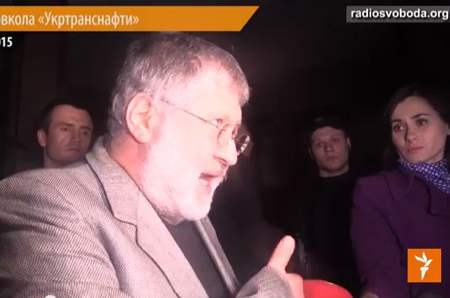
Dnipropetrovsk’s Kolomoyskyi: Patriotic, Corrupt, Threatening—Or All Three?
Ukrainian billionaire politician Ihor Kolomoyskyi resigned today as governor of Ukraine’s strategically critical Dnipropetrovsk province after clashing with the central government and parliament over control of two state-owned oil-sector companies. In that clash, Kolomoyskyi last week sent troops of an armed militia he controls to occupy the Kyiv headquarters of Ukrtransnafta, the country’s main pipeline operator.
Kolomoyskyi has been both an asset and a risk for Ukraine’s government, spending his money and political capital to make his province a firm bulwark against the Russian-sponsored insurgency in neighboring Donetsk. But his power, which includes a bloc of deputies in parliament, extends far beyond his province and in some respects has rivaled that of the central government. Civic and pro-democracy activists have said he is a prominent source of political corruption.
According to the Atlantic Council’s Adrian Karatnycky, Kolomoyskyi for months has been a danger as the biggest among several oligarchs who have been acting like regional warlords. So the outcome of his struggle now with the government will be important in either strengthening or undermining the rule of law and the accountability of government—key factors in Ukrainians’ struggle to become a democratic, Europe-focused state fully independent of Russia. With Kolomoyskyi’s dismissal, “the government and President set clear markers for responsible behavior by government officials. As importantly, the Kolomoyskyi crisis and its resolution presage full presidential and government control over independent battalions, which will now likely be integrated into a strict military chain of command,” Karatnycky said via e-mail from Kyiv.
The Atlantic Council’s Kyiv-based senior fellow, Brian Mefford, recounts on his blog that Kolomoyskyi has maintained effective control over Ukrnafta, the majority state-owned company that is Ukraine’s biggest producer of oil and gas. That’s because his own holding company, PrivatGroup, owns about 42 percent of Ukrnafta and has been able to paralyze decision-making there simply by boycotting meetings at which his firm’s presence was required to achieve a governing quorum. With this power, Kolomoyskyi had been able to keep his ally, Oleksandr Lazorko, in office since 2009 as Ukrnafta’s CEO. Under Lazorko, the company’s pipeline subsidiary, Ukrtransnafta, offered lucrative deals to a Kolomoyskyi-owned crude oil refinery. That’s an example of the hidden control of Ukraine by oligarchs that the pro-democracy Maidan movement—and now the reformist parliament elected last year—are struggling to replace with transparent, accountable governance.
Last week, the parliament, or Verkhovna Rada, passed a law to reduce Kolomoyskyi’s power as a minority shareholder in Ukrnafta—and the billionaire’s response astonished Ukrainians when it was caught on journalists’ video cameras. Masked, armed troops from his national guard battalion charged into a back door of the state pipeline company’s headquarters in the dead of night. When Kolomoyskyi emerged from the building to be questioned by reporters, he unleashed a tirade, alleging bizarrely that he had brought his forces to seize the company to prevent its takeover by Russian commandos.
Underlining the danger he poses to Ukraine’s democracy, Kolomoyskyi declared to journalists that he could bring 2,000 armed men to Kyiv within hours.
The billionaire’s effort at an armed corporate coup failed when the parliament voted, with a solid majority of 275 deputies, to change the quorum rules at Ukrnafta and thus end his control of both it and its pipeline subsidiary.
“Kolomoyskyi calculated that by being ‘super patriot #1’ for Ukraine, it would give him a permanent ‘get out of jail free card’ with regard to his often-unscrupulous business practices,” Mefford writes. Until now, his nationalist stance has accomplished that. “However now, Kolomoyskyi has united both the government and [politically powerful, rival] oligarchs against him,” Mefford writes in his blog. These include Viktor Pinchuk, the son-in-law of former President Leonid Kuchma; Rinat Akhmetov, the Donetsk-based metals magnate who is the country’s biggest billionaire; and Igor Yeremeyev, a businessman from the provincial city of Lutsk.
Yeremeyev last year rivaled Kolomoyskyi for influence in parliament as both men formed factions of loyal legislators amid reports of large bribes paid for those loyalties. The war between oligarchs, often hidden by closed-door government decision-making, broke into the open last week when a legislator of Yeremeyev’s faction (called “People’s Will”) introduced a bill to nationalize Kolomoyskyi’s Privatbank, the massive bank at the core of his business empire. Privatbank holds 26 percent of the deposits in Ukraine and 15 percent of bank assets. While the bill isn’t likely to go anywhere, it does give an indication of the open level of hostility against Kolomoyskyi from the oligarchs.
Image: A screenshot from a Radio Svoboda video report shows billionaire businessman and Dnipropetrovsk Governor Ihor Kolomoyskyi shouting at reporters as he emerged from the state-owned pipeline company headquarters seized last week by masked troops loyal to him. The video went viral in Ukraine as a show of the continued power of often-corrupt oligarchs, and Kolomoyskyi resigned as governor March 25. (RFE-RL video via YouTube)
